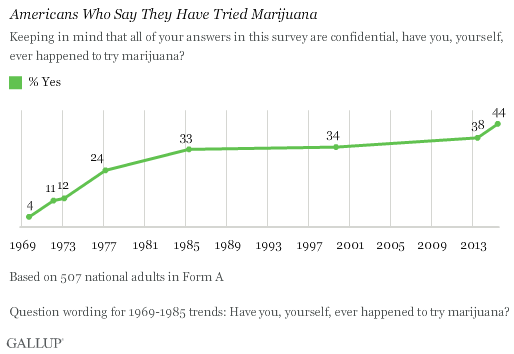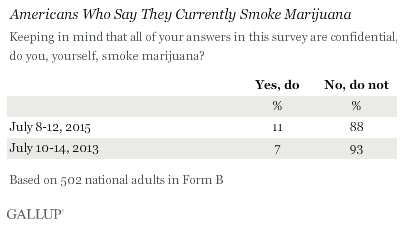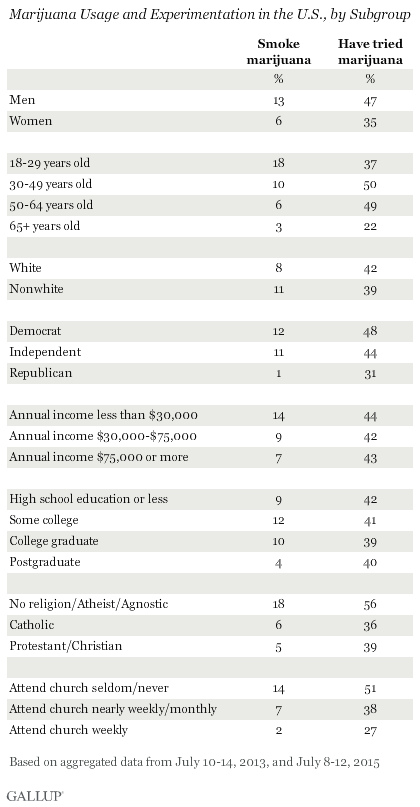Story Highlights
- Forty-four percent say they have tried marijuana
- About one in 10 Americans say they currently smoke pot
- Greatest differences in use and experimentation among age groups
WASHINGTON, D.C. -- As Oregon becomes the fourth state to make recreational marijuana use legal, 44% of Americans say they have tried marijuana. This is the highest percentage Gallup has found since it began asking the question in 1969. Back then, a mere 4% admitted to having tried it.

These data are based on a July 8-12 Gallup poll, which came on the heels of the latest victory for pro-marijuana legalization advocates when, on July 1, Oregon joined Colorado, Alaska, Washington and the District of Columbia in making recreational use legal.
Each time Gallup has polled on the question, Americans have become at least marginally more likely to say they have tried smoking pot, including a six-percentage-point increase in the latest poll. The changes over time may reflect either an increase in the percentage who have tried the drug, or an increased willingness to admit to having done so in the past. The latter possibility certainly seems plausible given Americans' growing support for legalizing marijuana in recent decades.
A separate question asks Americans more directly if they smoke marijuana now. Slightly more than one in 10 Americans (11%) say they do, up from 7% in 2013, although the shift is also within the poll's margin of error.

In comparison, a separate question in the poll finds 19% of Americans say they smoke cigarettes.
Use and Experimentation Differs Most by Age
Gallup used aggregated data from polls in 2013 and 2015 to look at subgroups. The overall averages for use of and experimentation with marijuana in the aggregated data are lower than the estimates for 2015.
An individual's likelihood of using or experimenting with marijuana is higher among certain demographics. Reports of using marijuana, for example, differ significantly by age.
Though Americans younger than age 30 are most likely to say they currently smoke pot (18%), adults between the ages of 30 and 64 are most likely to say they have ever tried it. The latter group includes many baby boomers, who accounted for the sharp increase in admitted use Gallup found between 1969 and 1973. Few adults in the 65 and older age group, which includes the oldest boomers, say they currently smoke marijuana (3%), and they are the least likely to say they have ever tried it (22%).
The more often one attends religious services, the less likely he or she is to admit to using or trying marijuana. Similarly, those who have no religious affiliation are much more likely to say they smoke marijuana (18%) than adults who identify themselves as Catholic (6%) or Protestant (5%).
Men (13%) are more than twice as likely as women (6%) to say they use marijuana. Nearly half of men have at least tried it, compared with 35% of women.

Age, Household Income Make Little Difference in Having Tried Marijuana
Whites and nonwhites are about equally as likely to have experimented with or to currently smoke marijuana. Americans across education and income groups are about equally as likely to say they have tried smoking pot.
Current marijuana use, however, does vary among income and education groups. Adults who earn less than $30,000 a year are most likely to say they currently smoke marijuana (14%) -- twice as likely as those earning $75,000 or more (7%). And Americans with graduate degrees are less likely to say they are current users (4%) compared with those with college degrees (10%), some college completed (12%) or a high school education or less (9%).
Bottom Line
Pot legalization, once written off as a liberal pipe dream, has found its way to the forefront of political discourse -- and onto ballots where voters in some states have chosen to make recreational use of the substance legal. In even more states, marijuana has been decriminalized or permitted for medical use.
Marijuana is being taken more seriously these days, and pro-legalization advocates are off to a strong start if their successes in Colorado and the Pacific Northwest are any indication of what could soon come to more states. The stigma associated with smoking marijuana appears to be loosening, and Americans may be less shy about revealing their experiences or habits than they have been in the past. For whatever reason, more Americans than ever before admit that they have smoked marijuana in the past, and there has been an increase in the modest percentage who say they currently smoke it.
Survey Methods
Results for this Gallup poll are based on telephone interviews conducted July 8-12, 2015, with a random sample of 1,009 adults, aged 18 and older, living in all 50 U.S. states and the District of Columbia. For results based on the total sample of national adults, the margin of sampling error is ±6 percentage points at the 95% confidence level. All reported margins of sampling error include computed design effects for weighting.
Each sample of national adults includes a minimum quota of 50% cellphone respondents and 50% landline respondents, with additional minimum quotas by time zone within region. Landline and cellular telephone numbers are selected using random-digit-dial methods.
View complete question responses and trends.
Learn more about how Gallup Poll Social Series works.

